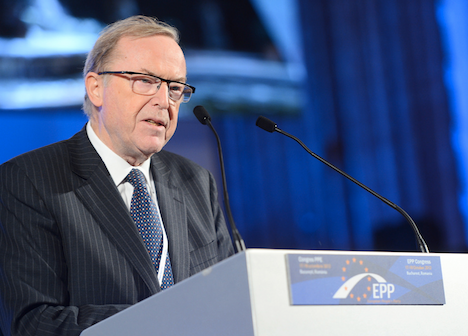Wilfried Martens, a longtime Belgian and European statesman, died last Wednesday night at the age of 77, and though it’s still been a few days, it’s worth pausing to consider his legacy to his country and his continent. ![]()
![]()
While European Commission president Jacques Delors, French president François Mitterrand and German chancellor Helmut Kohl all receive much of the credit for bringing about the modern-day version of the European Union and the single currency, Martens played a crucial role in boosting ever closer union, appropriately for someone who grew up in the aftermath of World War II in poverty in Ghent.
Between 1990 and 2013, Martens served as the leader of the chief center-right grouping in the European Parliament, the European People’s Party.
Belgium today seems to be virtually ungovernable amid splits between the Dutch/Flemish-speaking Flanders in the north and the French-speaking Wallonia in the south — the country famously went 589 days without a government between 2009 and 2011. Martens’s death draws a bright line against an era when Belgium, as a unitary state, was still governable, if something less than stable. The always-nimble Martens himself led nine different coalition governments of varying regional and ideological tilt between 1979 and 1992, becoming Belgium’s longest-serving postwar prime minister:
The crisis [that brought Martens to power] was the result of fundamental divisions between the coalition government’s Socialist and Christian Democrat parties over how to tackle economic problems, a burgeoning welfare deficit and the long-term decline of Belgium’s traditional heavy industries. This, together with growing tensions over the country’s regional and linguistic divide between Flemish and French speakers, formed long-running threads in his premiership and resulted in the sequence of shifting coalition allegiances over which Martens presided, as he came to be seen as the indispensable leader, the only man capable of holding factional governments together.
He achieved this balancing act with skill – not least in the face of opposition from some more senior ex-prime ministers – though King Baudouin must have become used to his regular trips to the palace to offer his resignation.
Economic crisis forced Belgium into undertaking many of the structural economic reforms that Germany and Sweden endured in the 1990s (under varying circumstances) and that much of Mediterranean Europe seems destined to enact at even more painful costs today. Though Martens came to power as a Flemish nationalist, he governed as a Belgian federalist — he helped craft a new constitutional arrangement that made Belgium a much more federal state, in which many powers are devolved to either the Flemish or Walloon regional governments.
If you’re paying attention in Madrid and London (and Barcelona and Edinburgh), the lesson of Martens-era Belgium is that even when Spain and the United Kingdom manage to return to healthier economic conditions, the Catalan and Scottish independence issues won’t necessarily retract. Continue reading Remembering the legacy of former Belgian PM Wilfried Martens
